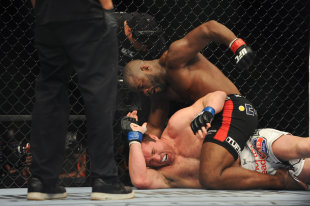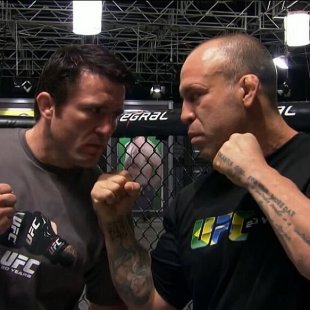Other fighters had quietly been issued therapeutic use exemptions (TUEs) for testosterone replacement therapy (TRT) long before Chael Sonnen made them household acronyms in the UFC.
Sonnen's TRT case is the most widely known, and in some ways, misunderstood, of all those exemptions given.
Last week, the Nevada Athletic Commission voted 4-0 to end all exemptions for TRT. A day later, the commission in Brazil followed suit.
The reasoning for the ban was sound: Less than one percent of all men need testosterone replacement without having previously abused steroids. Essentially, approval of TUEs for TRT amounted to state-sponsored cheating. So Nevada did the right thing and pulled the plug on them.
That won't stop illicit use of testosterone, or other anabolic steroids and performance-enhancing drugs, of course, but it's unseemly when a regulatory body OKs the use of a steroid because a person has used steroids in the past.
One of the primary causes of low testosterone in men under 40 is prior steroid abuse. Steroid usage suppresses the body's ability to produce testosterone and, as a result, the numbers are low and testosterone replacement is needed to boost the levels into the normal range.
There are numerous fighters who swore under oath before a state commission that they needed TRT in order to live healthy lives and that they had a medical condition which demanded it.
Sonnen famously told the Los Angeles Times, "I don't have an option. I either take this medicine or die."
In 2008, Sonnen was diagnosed with hypogonadism by his physician, Mark Czarnecki. At a licensing hearing in 2012, Dr. Timothy Trainor of the Nevada Athletic Commission testified that he believed Sonnen had hypogonadism and needed TRT.
The commission licensed him shortly thereafter.
Yahoo Sports spoke with Sonnen recently after Nevada's decision to end all TUEs for it. Sonnen conceded he'll be in a quandary if he is forced to compete without his medication.
"It puts me in a spot, because medically, I do need testosterone," Sonnen said. "I have to look at this carefully, but they made no bones about it: It's out. We all have to deal with that, whether we like it or not."
Sonnen did not directly address how he would handle his upcoming fight against Wanderlei Silva in Brazil.
Sonnen's TRT usage first came to light in California in 2010 after UFC 117, when he came within minutes of defeating Anderson Silva for the middleweight title. After the fight, the California commission announced that Sonnen's testosterone-to-epitestosterone ratio was 16.9:1, more than four times its legal limit of 4:1.
Sonnen's suspension in California ultimately wasn't because of his elevated T:E ratio, but rather for a failure to properly disclose his usage of testosterone replacement therapy.
In some states, an elevated T:E ratio alone is enough to be considered a violation. In Nevada, among other jurisdictions, an elevated T:E ratio would be a flag that would cause the commission to run a carbon isotope ratio (CIR) test that could conclusively determine whether the person tested had synthetic testosterone in their system.
[Also: Chael Sonnen on TRT ban: 'Quit complaining; testosterone is out']
The use of synthetic testosterone without a TUE is a violation in all states.
Nevada uses a 4:1 ratio, meaning a person can have four times more testosterone in his system than epitestosterone without his test result being flagged. A miniscule number of people naturally produce testosterone at a higher rate than 4:1, though the average man is 1:1.
That is not the case for fighters like Sonnen or Vitor Belfort, who produce far too little testosterone. Belfort, though, has tested positive for the anabolic steroid 4-hydroxytestosterone.
Symptoms of someone with low testosterone include decreased sex drive, fatigue, lack of energy, hair loss, loss of muscle mass, increase in body fat, a decrease in bone density, irritability and mood swings.
Sonnen said he wouldn't wish his symptoms when he is off his medication on anyone.
"The best way to describe is that it is a completely terrible, horrible feeling," Sonnen said. "This is a medicine and it's medicine I need to live normally on a day-to-day basis. People say it is a performance enhancer, and there are a lot of things guys can take to enhance performance. But testosterone is more than a performance enhancer for me. It is a life enhancer.
"My life is better. My attitude is better. I have more energy. I need less sleep. It makes me feel better in many different regards. It makes me a better husband and a better neighbor and a better pet owner. I understand the abuse, but this is a medicine that helps people with a problem."
The issue is that while it does help people who have hypogonadism, it's also easily abused by athletes who are looking to cheat.
And because a fight license is a privileged license, things that are legal for the average person aren't necessary allowable for a person seeking a privileged license.
So few men 40 and under truly need testosterone replacement therapy – some experts suggest the real number of people who need it is around one-tenth of one percent – but fewer commissions are willing to make an exception to allow it.
"We've never given one out in Pennsylvania," Pennsylvania State Athletic Commission executive director Greg Sirb said. "That takes you down a road that I think can lead to a lot of trouble."
And so those who may truly need the testosterone replacement to live well from day to day won't be able to use it if that person chooses to be a fighter.
"No one is telling anyone not to take their medicine," said Pat Lundvall, a member of the Nevada Athletic Commission. "If you have a condition and medicine has been prescribed to you by your doctor, then by all means, you should take your medication.
"But that doesn't mean you can come to us and ask us to change our rules for you. We as a commission looked carefully at this issue and have decided we're no longer going to hand out [a TUE for TRT]. We're not encouraging or telling anyone not to take medicine they need. But we've made it pretty clear now what our stance on this issue is."































